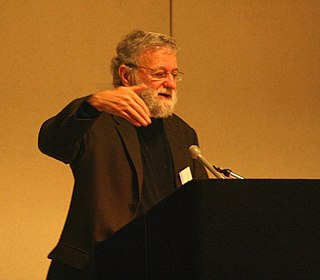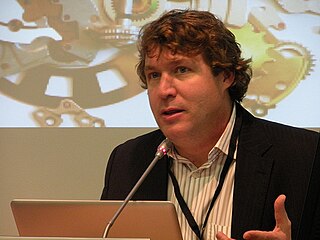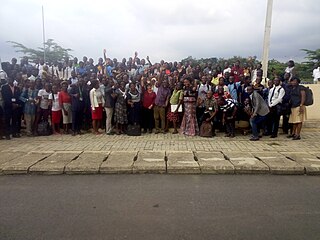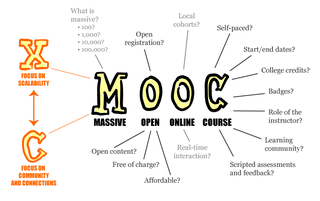
Donald Arthur Norman is an American researcher, professor, and author. Norman is the director of The Design Lab at University of California, San Diego. He is best known for his books on design, especially The Design of Everyday Things. He is widely regarded for his expertise in the fields of design, usability engineering, and cognitive science. He is a co-founder of the Nielsen Norman Group, along with Jakob Nielsen. He is also an IDEO fellow and a member of the Board of Trustees of IIT Institute of Design in Chicago. He also holds the title of Professor Emeritus of Cognitive Science at the University of California, San Diego. Norman is an active Distinguished Visiting Professor at the Korea Advanced Institute of Science and Technology (KAIST), where he spends two months a year teaching.

The School of Computer Science (SCS) at Carnegie Mellon University in Pittsburgh, Pennsylvania, US is a school for computer science established in 1988. It has been consistently ranked among the top computer science programs over the decades. As of 2010 U.S. News & World Report ranks the graduate program as tied for 1st with Massachusetts Institute of Technology, Stanford University, and University of California, Berkeley. It is ranked 1st in the United States on Computer Science Open Rankings, which combines scores from multiple independent rankings.
Mihai Nadin is a scholar and researcher in electrical engineering, computer science, aesthetics, semiotics, human-computer interaction (HCI), computational design, post-industrial society, and anticipatory systems. His publications on these topics number over 200, and he has lectured throughout the world.
James D. Hollan is professor of cognitive science and adjunct professor of computer science at the University of California, San Diego. In collaboration with Professor Edwin Hutchins, he directs the Distributed Cognition and Human–Computer Interaction Laboratory at UCSD, and co-directs the Design Lab. Hollan has also spent time working at Xerox PARC and at Bellcore. He was elected to the CHI Academy in 2003 and received the ACM SIGCHI Lifetime Research Award in 2015.

Eric Paulos is an American computer scientist, artist, and inventor, best known for his early work on internet robotic teleoperation and is considered a founder of the field of Urban Computing, coining the term "urban computing" in 2004. His current work is in the areas of emancipation fabrication, cosmetic computing, citizen science, New Making Renaissance, Critical Making, Robotics, DIY Biology, DIY culture, Micro-volunteering, and the cultural critique of such technologies through New Media strategies.

George Siemens is a Canadian expatriate professor of psychology at the University of Texas at Arlington and professor and director of the Centre for Change and Complexity in Learning at the University of South Australia. He is known for his theory of connectivism, which seeks to understand learning in the digital age. He played a role in the early development of massive online open courses (MOOCs).
Katherine Isbister is a game and human computer interaction researcher and designer, currently a professor in computational media at the University of California, Santa Cruz. Until June 2015, she was an associate professor at New York University, with a joint appointment in computer science and in the Game Center at the Tisch School of the Arts. At NYU, she was founding research director of the Game Innovation Lab. Isbister's research and design contributions center on how to create more compelling emotional and social qualities in games and other digital experiences. She has innovated in the areas of character/avatar/agent design and in researching and evaluating the user experience. Her book, Better Game Characters by Design: A Psychological Approach, was nominated in 2006 for a Game Developer Magazine Frontline award. She is also co-editor of a book which outlines the state of the art in user research practices in studying games, titled Game Usability: Advice from the Experts for Advancing the Player Experience.

Andrew Yan-Tak Ng is a British-born American computer scientist and technology entrepreneur focusing on machine learning and AI. Ng was a co-founder and head of Google Brain and was the former chief scientist at Baidu, building the company's Artificial Intelligence Group into a team of several thousand people.

Jennifer Widom is an American computer scientist known for her work in database systems and data management. She is notable for foundational contributions to semi-structured data management and data stream management systems.

John Clifford Mitchell is professor of computer science and electrical engineering at Stanford University. He has published in the area of programming language theory and computer security.
The Cyberinfrastructure for Network Science (CNS) Center was founded in October 2005 by Professor Katy Börner at Indiana University, Bloomington. It emerged from the Information Visualization Lab at IU that focused on the analysis and visualization of data since 1999. With the advent of CNS, the mission was broadened from providing a research lab to building an entity that would advance datasets, tools, and services for the study of biomedical, social and behavioral science, physics, and other networks. A specific focus of CNS is research on the structure and evolution of science and technology (S&T) and the communication of results via science maps.

Paul Kim is currently a Korean-American Chief Technology Officer and Associate Dean at the Stanford Graduate School of Education and has held this position since 2001.

A massive open online course or an open online course is an online course aimed at unlimited participation and open access via the Web. In addition to traditional course materials, such as filmed lectures, readings, and problem sets, many MOOCs provide interactive courses with user forums or social media discussions to support community interactions among students, professors, and teaching assistants (TAs), as well as immediate feedback to quick quizzes and assignments. MOOCs are a widely researched development in distance education, first introduced in 2008, that emerged as a popular mode of learning in 2012.
Vincent Aleven is a professor of human-computer interaction and director of the undergraduate program at Carnegie Mellon University's Human–Computer Interaction Institute.

Fei-Fei Li is an American computer scientist. She is the Sequoia Capital Professor of Computer Science at Stanford University. Li is a Co-Director of the Stanford Institute for Human-Centered Artificial Intelligence, and a Co-Director of the Stanford Vision and Learning Lab. She served as the director of the Stanford Artificial Intelligence Laboratory (SAIL) from 2013 to 2018.

kadenze.com, operated by Kadenze, Inc. ("Kadenze"), is a for-profit massive open online course (MOOC) provider that offers courses geared toward art, music, and creative technology, fields which are falling behind other fields such as computer science in terms of number of courses offered in the MOOC space. It was launched on June 16, 2015 with 18 academic partners including: Stanford University, Princeton University, UCLA, California Institute of the Arts, School of Art Institute of Chicago, Maryland Institute College of Art, Goldsmiths College, MassArt, Seoul Institute of the Arts, Paris College of Art, National University of Singapore, Cornish College of Art, University of Texas at Austin, Rhode Island School of Design, Pacific Northwest College of Art, Arizona State University, Columbus College of Art and Design, and School of Visual Arts.
Language MOOCs are web-based online courses freely accessible for a limited period of time, created for those interested in developing their skills in a foreign language. As Sokolik (2014) states, enrolment is large, free and not restricted to students by age or geographic location. They have to follow the format of a course, i.e., include a syllabus and schedule and offer the guidance of one or several instructors. The MOOCs are not so new, since courses with such characteristics had been available online for quite a lot of time before Dave Cormier coined the term 'MOOC' in 2008. Furthermore, MOOCs are generally regarded as the natural evolution of OERs, which are freely accessible materials used in Education for teaching, learning and assessment.

Chris Harrison is a British-born, American computer scientist and entrepreneur, working in the fields of human–computer interaction, machine learning and sensor-driven interactive systems. He is a professor at Carnegie Mellon University and director of the Future Interfaces Group within the Human–Computer Interaction Institute. He has previously conducted research at AT&T Labs, Microsoft Research, IBM Research and Disney Research. He is also the CTO and co-founder of Qeexo, a machine learning and interaction technology startup.

Jacob O. Wobbrock is a Professor in the University of Washington Information School and, by courtesy, in the Paul G. Allen School of Computer Science & Engineering at the University of Washington. He is Director of the ACE Lab, founding Co-Director of the CREATE center, and a founding member of the DUB Group and the MHCI+D degree program.
Surya Ganguli is a University Professor at Stanford University and a Visiting Research Professor at Google. Dr. Ganguli is primarily known for his work on neural networks and deep learning, although he has also published papers on theoretical physics. He presently runs the Neural Dynamics and Computation Lab at Stanford, where he aims to reverse engineer how networks of neurons and synapses cooperate across multiple scales of space and time to facilitate sensory perception, motor control, memory, and other cognitive functions. He is also known for being a prolific public speaker and lecturer, having been invited to give over 200 talks at various universities, institutes, workshops, conferences, and symposiums since 2005.













